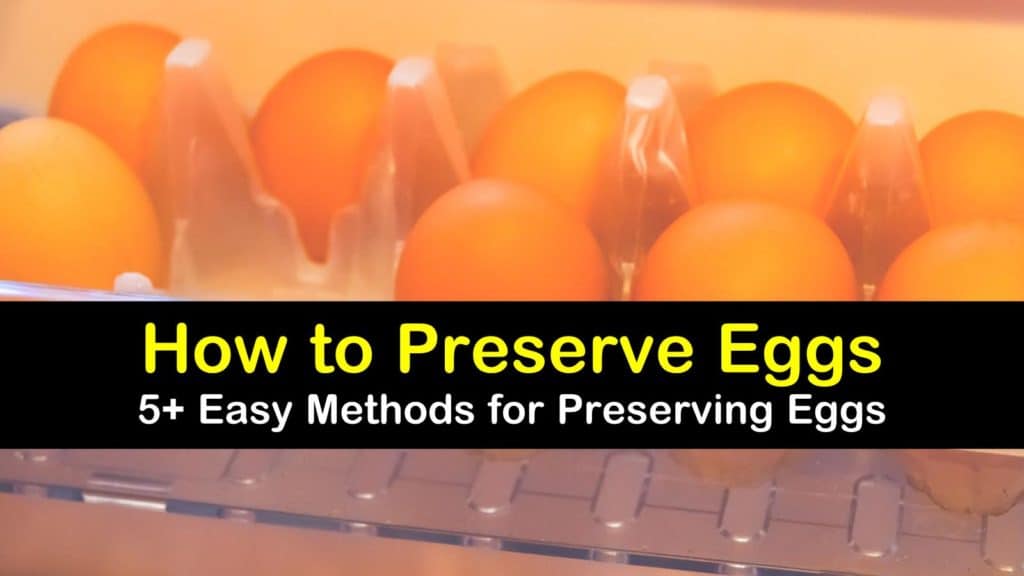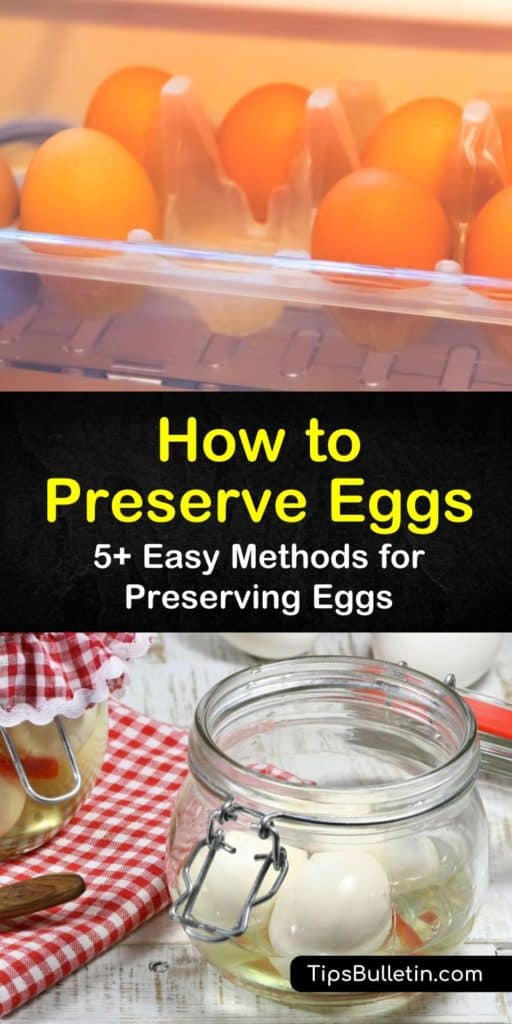Picking up a dozen eggs from the store is a task that most of us are familiar with. These little protein balls are only continuing to grow in popularity due to their health benefits and delicious taste. As the demand for fresh eggs increases, so does the need for learning how to preserve eggs.
We see an increase in people wanting to become more self-sufficient, and one of the first steps for a homesteader is to purchase their own chickens that lay fresh eggs.
Many people don’t know, though, that egg production from chickens slows in the winter, leaving you with a surplus of eggs to either eat, sell, or preserve during the summer.
Turning your supply of fresh eggs into egg salad or a cake only lasts for so long. The average chicken can lay up to 250 eggs each year.
Now, add an entire coop of chickens into the equation. That’s an awful lot of eggs to eat before they spoil. Preserving eggs at home is the best solution.

How Long Do Eggs Last?
It doesn’t matter if you purchase your eggs from a grocery store or have to worry about storing farm fresh eggs, or even if you get your eggs homesteading, if you’ve found yourself with a surplus of eggs, then it is time to learn some vital information about chicken eggs.
In the United States, the egg shells are washed and sanitized very shortly after being laid to prevent the growth of salmonella. An unfortunate trade-off from washing the eggs is that it damages the natural coating, allowing bacteria to move easily through the shell.
Store your eggs in the back of your fridge to prevent them from absorbing odors and avoid temperature fluctuations. Set your refrigerator’s temperature to below 40℉. Eggs should last four to five weeks when stored in their shell.

Do eggs go bad? How can you tell? Do not leave a store-bought or washed egg at room temperature for more than two hours.
You may be able to eat your eggs past the date labeled on the carton. To check for spoilage, you can either smell the egg, which is usually a big giveaway, or perform the float test.
Fill a water glass with cold water and place the egg inside. If the egg sinks or lays flat on the bottom of the glass, the egg is good. If it stands on one end or floats, the egg is spoiled. If you have an old egg that is about to go bad, use it for an omelet, casserole, or quiche.
Different Ways to Preserve Eggs
Farm fresh eggs are full of protein, help boost brain health, and support a healthy immune system. It is wasteful to dispose of this beneficial ingredient when there are plenty of egg preservation options.
Some of the more unique preservation methods include using wood ash, freeze-drying, and fermenting. This article lists some egg storage options that are much more attainable and budget-friendly.
Preserving Eggs in the Freezer
The freezer is your friend for preserving milk, herbs, and many other foods. Although you shouldn’t place your whole eggs directly into the freezer, there is a quick way to store raw eggs that helps with both food storage and meal prep.
For freezing chicken eggs, break one dozen eggs into a glass bowl, then beat them with a fork or whisk. Pour the raw eggs into an ice cube tray and freeze. Remove each frozen cube and wrap it in plastic wrap. Place the wrapped egg cubes in a freezer bag.
One frozen cube is about equal to one egg. Whenever you desire a quick breakfast, grab a frozen cube or two, and throw it in a hot pan to scramble. These frozen eggs last up to three months in the freezer.
Preserving Eggs that are Baked
If you’d rather have your eggs cooked and ready to eat, there is a simple and delicious way to store your extra eggs. Many meal preppers love these baked eggs for a quick, on-the-go breakfast.
Spray a muffin pan with non-stick spray. Crack a single egg into each muffin spot. Use a fork to scramble the eggs and bake at 350℉ for 30 minutes. The eggs have finished cooking once the egg whites are entirely white and no longer runny.
Wrap each egg in paraffin paper and place together in a freezer bag for up to three months. Take them out of the freezer and pop them in the microwave to eat on a breakfast sandwich or to enjoy individually.
How to Preserve Eggs with Oil
Only use this food storage practice with farm fresh eggs or unwashed eggs that have been laid by your own chickens. Because store-bought eggs are washed, the air pockets that allow bacteria to move are likely too large for properly preserving eggs this way.
Use your hands to coat each egg in food grade mineral oil. Place the eggs fat-end up in the egg carton. Store in a cool, dry place.
The mineral oil replaces the naturally protective coating to prevent bacteria from entering the egg. Storing the eggs upside down makes air pockets inside migrate away from the egg yolks and inhibits oxidation.
These eggs last up to nine months at room temperature. If you can’t find any mineral oil, lard makes an excellent substitute.
Water Glassing Eggs
One of the lesser-known ways to preserve eggs involves a process called water glassing. Only use unwashed eggs for this long-term storage option.
In a stoneware crock, combine two parts water with one-part Water Glass. Place eggs in the solution, making sure that all the eggs are covered by two inches of liquid.
Store eggs inside the crock in a cool, dry place. The shelf life for a crock without a lid is about 18 months, while a crock with an airtight lid that remains closed remains unspoiled for three years.
Preserving Boiled Eggs
Sometimes, our eggs aren’t always fresh when we are looking for ways to preserve them. If there is a situation where preserving boiled eggs is necessary, you can make some egg salad or extend their shelf life by pickling them.
It’s much easier to tell when egg salad is gone bad rather than pickling but it also happens faster, too. Egg salad only lasts a few days but pickled eggs last for several months.
To pickle eggs, pour beet juice and the rest of the ingredients in a medium pot. Cook on medium heat for eight minutes, stirring occasionally.
Add the beets into the liquid. Bring to a boil. Place the eggs, without their shells, inside the glass jars. Pour the boiling water mixture into the jars and place the lid on top.
Refrigerate the eggs for one to two weeks before eating. Eat within four months for the best quality.
Pickling is a great way to store all kinds of foods for the long term. It’s the best way to preserve ginger, asparagus, and almost all types of produce.
Dehydrating Eggs
Dehydrating any food dramatically extends its shelf life. There are two methods to dehydrate eggs: The cook-dry technique or the wet-dry technique.
For the cook-dry, scramble eggs in a hot pan. Dehydrate them for four hours. Blend the dried eggs in a blender or food processor to form a powder.
For the wet-dry, beat raw eggs and spread them on a fruit-roll sheet. Dehydrate the eggs for 10-12 hours. Blend in a blender or food processor.
Store the powdered eggs in a cool place. They last about a year in the fridge or for one month at room temperature. A dehydrator can be purchased at your nearest superstore.
If you have too many eggs in one basket, there are plenty of ways to preserve eggs, so you don’t have to throw out a reliable protein source. Knowing how to preserve eggs keeps this snack fresh in your home year-round.

If you found learning how to preserve eggs beneficial for your homestead, share these egg preservation ideas on Facebook and Pinterest.